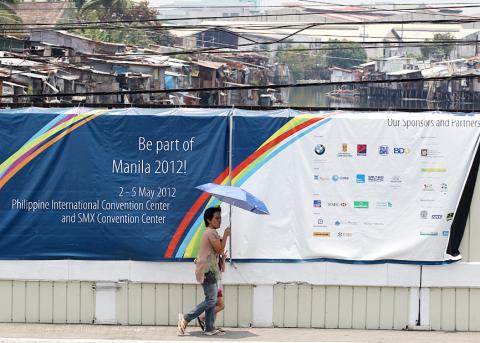Delegates attending an international conference in the Philippine capital might not see what they came to discuss: abject poverty.
A makeshift, temporary wall has been erected across a bridge on a road from the airport to downtown Manila that hides a sprawling slum along a garbage-strewn creek.
Presidential spokesman Ricky Carandang defended the wall’s installation, saying yesterday “any country will do a little fixing up before a guest comes.”

Photo: EPA
He expressed hope that this week’s annual meeting of the Asian Development Bank (ADB) Board of Governors, which includes finance ministers and senior officials from 67 member states, will show the Philippines is open for business. The lending institution, which is headquartered in its own walled compound in Manila, aims to cut poverty in the Asia-Pacific region.
“We need to show our visitors that Metro Manila is orderly. We owe it to ourselves,” Metro Manila chief Francis Tolentino said. “I see nothing wrong with beautifying our surroundings. We are not trying to keep the poor out of the picture.”
There was no immediate comment from ADB.
The Philippine Communist Party recalled that former Philippine first lady Imelda Marcos — notorious for living an ostentatious lifestyle — was ridiculed for trying to hide squatter colonies. She erected similar whitewashed walls along the route of foreign visitors to the Miss Universe pageant in Manila in 1974, and other international events.
“The government should face reality. If they don’t, how will they know the problem, how will they solve the problem?” asked Renato Reyes, secretary general of the largest left-wing group Bayan. “By covering the truth, they lose the energy or intention to resolve the problem.”
About a third of Manila’s 12 million residents live in slums, and a third of 94 million Filipinos live below the poverty line of US$1.25 a day. Overall, more than half the population in Asia remains poor.

Yemen’s separatist leader has vowed to keep working for an independent state in the country’s south, in his first social media post since he disappeared earlier this month after his group briefly seized swathes of territory. Aidarous al-Zubaidi’s United Arab Emirates (UAE)-backed Southern Transitional Council (STC) forces last month captured two Yemeni provinces in an offensive that was rolled back by Saudi strikes and Riyadh’s allied forces on the ground. Al-Zubaidi then disappeared after he failed to board a flight to Riyadh for talks earlier this month, with Saudi Arabia accusing him of fleeing to Abu Dhabi, while supporters insisted he was

The Chinese Embassy in Manila yesterday said it has filed a diplomatic protest against a Philippine Coast Guard spokesman over a social media post that included cartoonish images of Chinese President Xi Jinping (習近平). Philippine Coast Guard spokesman Jay Tarriela and an embassy official had been trading barbs since last week over issues concerning the disputed South China Sea. The crucial waterway, which Beijing claims historic rights to despite an international ruling that its assertion has no legal basis, has been the site of repeated clashes between Chinese and Philippine vessels. Tarriela’s Facebook post on Wednesday included a photo of him giving a

‘MOBILIZED’: While protesters countered ICE agents, Minnesota Governor Tim Walz activated the state’s National Guard to ‘support the rights of Minnesotans’ to assemble Hundreds of counterprotesters drowned out a far-right activist’s attempt to hold a small rally in support of US President Donald Trump’s latest immigration crackdown in Minneapolis, Minnesota, on Saturday, as the governor’s office announced that National Guard troops were mobilized and ready to assist law enforcement, although not yet deployed to city streets. There have been protests every day since the US Department of Homeland Security (DHS) ramped up immigration enforcement in the Twin Cities of Minneapolis and Saint Paul by bringing in more than 2,000 federal officers. Conservative influencer Jake Lang organized an anti-Islam, anti-Somali and pro-US Immigration and Customs Enforcement

NASA on Saturday rolled out its towering Space Launch System (SLS) rocket and Orion spacecraft as it began preparations for its first crewed mission to the Moon in more than 50 years. The maneuver, which takes up to 12 hours, would allow the US space agency to begin a string of tests for the Artemis 2 mission, which could blast off as early as Feb. 6. The immense orange and white SLS rocket, and the Orion vessel were slowly wheeled out of the Vehicle Assembly Building at the Kennedy Space Center in Florida, and painstakingly moved 6.5km to Launch Pad 39B. If the